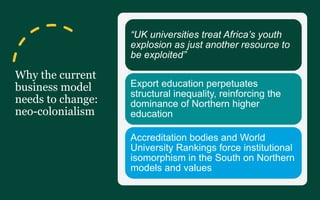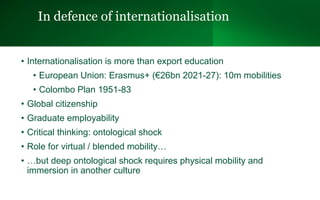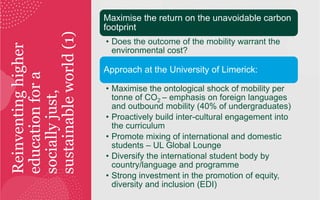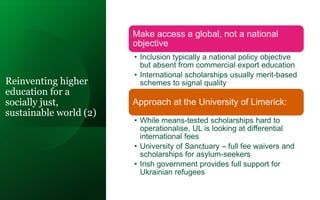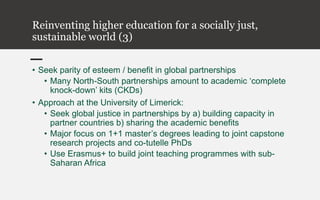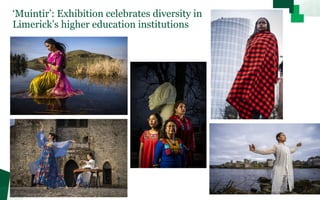Reinventing international higher education for a socially just, sustainable world
- 1. Reinventing international higher education for a socially just, sustainable world Professor Nigel Healey Vice President Global and Community Engagement APAIE 15 March 2023
- 3. Overview The current business model of international higher education Why the current business model needs to change In defence of internationalisation Reinventing higher education for a socially just, sustainable world
- 4. The current business model: international higher education % international enrolments % market share of global market 2010 2014 2019 2019 Australia 21% 18% 28% 8% Canada n/a 10% 16% 5% Ireland n/a 7% 11% 0% New Zealand 14% 19% 21% 1% United Kingdom 16% 18% 19% 8% United States 3% 4% 5% 16% Source: Education at a glance 2021 (OECD)
- 5. The current business model: the virtuous circle WUR Institution % international enrolments 1 Massachusetts Institute of Technology 32.8% 2 University of Cambridge 37.7% 3 Stanford University 22.8% 4 University of Oxford 41.1% 5 Harvard University 24.6% 6= California Institute of Technology 30.5% 6= Imperial College London 61.1% 8 University College London 60.9% 9 ETH Zurich 40.3% 10 University of Chicago 27.2% Source: https://www.topuniversities.com/university-rankings/world-university-rankings/2023
- 6. The current business model: risks exposed by Covid-19 WUR Institution Fixed-term/permanent job losses March 2020-March 2021 % international enrolments 45 UNSW -728 -10.0% 46.8% 57 Monash -628 -7.4% 55.0% 190= RMIT -583 -12.4% 31.3% 137 UTS -489 -12.6% 40.8% 30 ANU -470 -9.8% 35.6% Source: Department of Education
- 7. Why the current business model needs to change: environmental cost (1) Source: Accelerating the UK Tertiary Education Sector towards Net Zero
- 8. Why the current business model needs to change: environmental cost (2) Student flights (12%) + business travel (3%) = 15% of total 22% of UK universitiesâ direct carbon emissions (excl. supply chain) De Jonge Akademie (2020) estimated academic business travel in the range of 12-27% of direct emissions for NL universities Return economy class flight PEK-LHR = 2.4t of CO2 Return business class flight PEK-LHR = 9.4t of CO2 Compares with mean pc CO2 emissions of 5.2t in 2021 in UK Source: https://www.carbonfootprint.com/calculator.aspx
- 9. Why the current business model needs to change: negative impact on source countries âĒ Drain on foreign exchange âĒ Inflated cost of educating wealthy elites: âIn which moral universe can youâĶcharge [African students] three times the fees that you would charge middle-class students in the UK?â âĒ Brain drain â exacerbated by the use of post-study immigration regimes as a tool of national competitive advantage âĒ Brain drain is worse the more highly skilled the graduates: eg, 68% international students on US doctoral programmes still working in US five years after graduation
- 10. Why the current business model needs to change: neo-colonialism âUK universities treat Africaâs youth explosion as just another resource to be exploitedâ Export education perpetuates structural inequality, reinforcing the dominance of Northern higher education Accreditation bodies and World University Rankings force institutional isomorphism in the South on Northern models and values
- 11. In defence of internationalisation âĒ Internationalisation is more than export education âĒ European Union: Erasmus+ (âŽ26bn 2021-27): 10m mobilities âĒ Colombo Plan 1951-83 âĒ Global citizenship âĒ Graduate employability âĒ Critical thinking: ontological shock âĒ Role for virtual / blended mobilityâĶ âĒ âĶbut deep ontological shock requires physical mobility and immersion in another culture
- 12. Reinventing higher education for a socially just, sustainable world (1) Maximise the return on the unavoidable carbon footprint âĒ Does the outcome of the mobility warrant the environmental cost? Approach at the University of Limerick: âĒ Maximise the ontological shock of mobility per tonne of CO2 â emphasis on foreign languages and outbound mobility (40% of undergraduates) âĒ Proactively build inter-cultural engagement into the curriculum âĒ Promote mixing of international and domestic students â UL Global Lounge âĒ Diversify the international student body by country/language and programme âĒ Strong investment in the promotion of equity, diversity and inclusion (EDI)
- 13. Reinventing higher education for a socially just, sustainable world (2) Make access a global, not a national objective âĒ Inclusion typically a national policy objective but absent from commercial export education âĒ International scholarships usually merit-based schemes to signal quality Approach at the University of Limerick: âĒ While means-tested scholarships hard to operationalise, UL is looking at differential international fees âĒ University of Sanctuary â full fee waivers and scholarships for asylum-seekers âĒ Irish government provides full support for Ukrainian refugees
- 14. Reinventing higher education for a socially just, sustainable world (3) âĒ Seek parity of esteem / benefit in global partnerships âĒ Many North-South partnerships amount to academic âcomplete knock-downâ kits (CKDs) âĒ Approach at the University of Limerick: âĒ Seek global justice in partnerships by a) building capacity in partner countries b) sharing the academic benefits âĒ Major focus on 1+1 masterâs degrees leading to joint capstone research projects and co-tutelle PhDs âĒ Use Erasmus+ to build joint teaching programmes with sub- Saharan Africa
- 15. âMuintirâ: Exhibition celebrates diversity in Limerickâs higher education institutions
- 16. Go raibh maith agat (Gur ruh mah a-gut) For more details: âĒ nigel.healey@ul.ie For more information and research on international higher education: âĒ https://limerick.academia.edu/NigelHealey

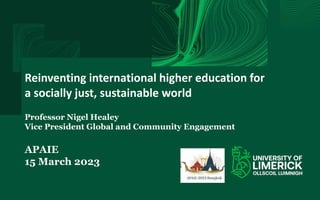

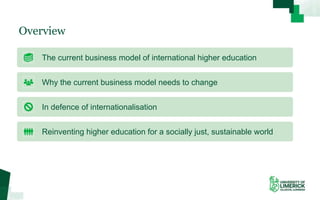
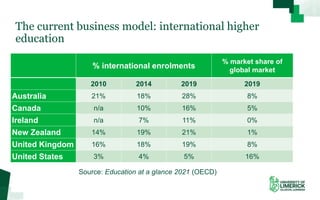
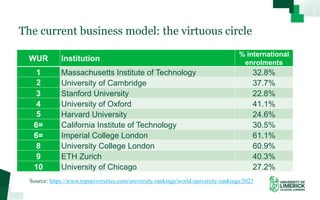


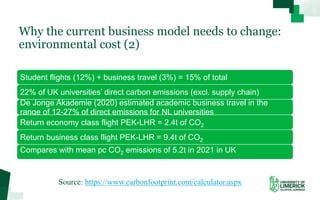
![Why the current
business model
needs to
change:
negative impact
on source
countries
âĒ Drain on foreign exchange
âĒ Inflated cost of educating wealthy elites:
âIn which moral universe can
youâĶcharge [African students] three
times the fees that you would charge
middle-class students in the UK?â
âĒ Brain drain â exacerbated by the use of
post-study immigration regimes as a tool
of national competitive advantage
âĒ Brain drain is worse the more highly
skilled the graduates: eg, 68%
international students on US doctoral
programmes still working in US five
years after graduation](https://image.slidesharecdn.com/8e-1reinventinginternationalhighereducationforasociallyjustsustainableworldnigelhealey-230315101636-3621d65b/85/Reinventing-international-higher-education-for-a-socially-just-sustainable-world-9-320.jpg)
